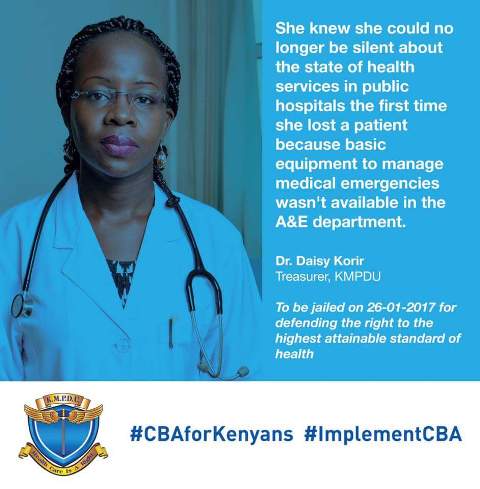By Audrey Wabwire and Abdullahi Abdi
Published February 6, 2017
 “I am staring death in the eye. We are dying one by one,” Rose Adhiambo says. “My friend, a cancer patient like me, was buried today. I am stuck in this private hospital now with bills that I cannot pay.”
“I am staring death in the eye. We are dying one by one,” Rose Adhiambo says. “My friend, a cancer patient like me, was buried today. I am stuck in this private hospital now with bills that I cannot pay.”
Adhiambo, a 46-year-old widow living in the Kibera slum in the Kenyan capital, Nairobi, was diagnosed with breast cancer in 2014 and received chemotherapy at a public, state-run hospital. But state-paid doctors went on strike in December 2016 demanding the implementation of an agreement between their union and the government. The collective bargaining agreement (CBA), signed in 2013, aimed to improve health facilities in public hospitals, including better working conditions for doctors.
Because of the strike, Rose Adhiambo, like many other Kenyans, was forced to raise large amounts of money to pay a private hospital for her life-saving treatment. Now, although she has completed treatment, the hospital will not release her until she pays her bills.
And the strike continues. Talks between the government and doctors have been unsuccessful. On February 3, 2017 Kenya’s courts granted seven more days for negotiations, and have threatened to send the doctors to jail if there is no resolution.
RELATED:How Useful Are East Africa’s Medical Volunteers?
The seven leaders of the Kenya Medical Practitioners, Pharmacists & Dentists Union (KMPDU) were first to have been sent to jail on January 26 before the court pushed the jailing to February 3 and then said it had given the physicians seven more days within which to call of the strike or go to jail.
 Doctors allege that access to healthcare in Kenya has seriously deteriorated due to massive corruption in the sector.
Doctors allege that access to healthcare in Kenya has seriously deteriorated due to massive corruption in the sector.
In 2016, a leaked internal audit report revealed that top officials in the Ministry of Health stole more than Sh5 Billion (almost US$50 million) during the 2015/2016 financial year. Since the strike, doctors have told countless stories on social media of awful working conditions – power going out during surgery with patients open on the operating table; no post-exposure prophylaxis after being pricked by a needle while treating someone with HIV; watching a patient die because the local assemblyman took the ambulance to sell his tomatoes at market.
The government argues that, notwithstanding that it signed up to the 2013 bargaining agreement, it has been declared “illegal”, and doctors cannot use it to negotiate. The government hasn’t resolved the stand-off.
RELATED:Toxic Lead Threatens Thousands of Lives on the Kenyan Indian Ocean Coast
 The impact of the strike is clear when one visits the state-funded Kenyatta National Hospital. There are no doctors, and dusty, abandoned stretchers litter the wards.
The impact of the strike is clear when one visits the state-funded Kenyatta National Hospital. There are no doctors, and dusty, abandoned stretchers litter the wards.
The media have reported that many people have died because of the strike, since the alternative to public hospitals, private ones, are too expensive for most Kenyans. Some, like Rose, have ended up detained in the very hospital that was treating them, although detention for debt is a violation of international law.
RELATED:Poverty and Lax Laws Lure Children into Sex Tourism along East African Coast
The government should protect Kenyans’ rights to health and life, and work with doctors to reach a solution.
A Human Rights Watch article





